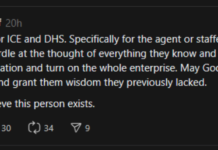Serious governance issues arise from the reported resignation of Rev Tony Jones, the Anglican minister accused of creating ‘a culture of fear’ at Christ Church Durham in the UK, as senior pastor of Immanuel Leidy’s Church in Pennsylvania.
In the past fortnight, two members of Immanuel, one of them an Elder, have contacted me because of my story on Anglican Ink in March last year, which reported Jones’s move to America in the wake of the controversy in Durham. They were seeking sourced information about Jones’s alleged behaviour in Durham.
I was unable to furnish them with that, so I referred them to Evangelicals Now (EN), a UK-based monthly magazine for Reformed and conservative evangelical readers, which last year broke the story of the allegations against Jones.
The Immanuel members reported that Jones was continuing his allegedly coercive patterns of behaviour at their church. They told me that last week Jones had been presented with a congregational petition to have him removed as senior pastor. This petition had reportedly gathered over 100 signatures ahead of a congregational meeting Jones had been forced to hold on April 23 when a vote would be taken.
I was then informed that Jones had resigned as senior pastor on the morning of April 11, together with the assistant minister, Michael Nowling. The petition had reportedly called for his removal as well.
Immanuel Leidy’s in Souderton PA, founded in 1858 as a German Reformed Church and now describing itself as ‘an independent congregation’, appointed Jones as its senior pastor in October 2021.
In late February 2022, after he had moved to the United States, EN first reported that ‘several whistle-blowers’ at Christ Church Durham had accused him of ‘abuses of power and governance’ and presiding over ‘a culture of fear’.
Jones was ordained in the Church of England and from 1999 to 2003 was curate a St Ebbe’s Oxford, a large conservative evangelical church in the city centre attended by many university students. He then launched Christ Church Durham, an independent Anglican congregation aiming to attract students from the city’s university. EN reported that since the church ‘was established nearly 20 years ago’, it has seen ‘significant numerical growth’ and has spawned a church plant.
In the light of the off-the-record reports I have received, I this week contacted the Immanuel church office asking whether an authorised church spokesperson would be willing and able to confirm Jones’s and Nowling’s resignations on April 11. I also asked for confirmation of the congregational petition calling for the removal of the two pastors.
I asked some questions about Michael Nowling, who seems to have become the church’s assistant pastor during Jones’s tenure, having been youth and children’s pastor:
‘Why did Mr Nowling resign as well? Why was he mentioned in the petition if the alleged problems were to do with Mr Jones’s leadership?
‘What allowances are being made for the fact that Mr Nowling seems to be younger than Mr Jones and relatively new to public ministry?’
It is unfortunately possible that Nowling could have been naively sucked into becoming Jones’s crony cum sidekick and that he has been swept up in the backlash.
About Jones’s appointment I asked:
‘What did the leaders involved in interviewing Mr Jones before he was voted to be senior pastor by the congregation in October 2021 know about the alleged problems with his leadership at Christ Church Durham and when did they know it?’
I had earlier invited Jones via the church office to reply to the allegations about his conduct.
Christian well-wishers of the church will be hoping that it can appoint a godly and loving new senior pastor and move on from the recent problems. A full and transparent statement from the church would very arguably help the church to do that. But Immanuel’s congregational governance raises some issues:
Will the new pastor be able to be prophetic with the congregation or, however hard he tries to be transparent, empathetic and collaborative in his ministry, will he be in fear that he could face a petition if he ruffles feathers for the right reasons? Will the truism that he who pays the piper calls the tune hamstring the new pastor’s ministry? How much employment protection do ministers have in independent churches?
Anglican episcopal governance is certainly not fail-safe. But arguably it does provide some protection for ministers against excessive congregational control and vice versa. Could a church like Immanuel Leidy’s benefit from an external council of reference made up of mature Christians who are members of other evangelical churches?
Perhaps a prospective new senior pastor might be wise to insist on that as a condition of his appointment.
Julian Mann is a former Church of England vicar, now an evangelical journalist based in the UK.




[…] abuse at Christchurch Durham in the UK, has launched a new church in Pennsylvania 12 days after resigning from Immanuel Leidy’s where he was senior pastor for 15 […]